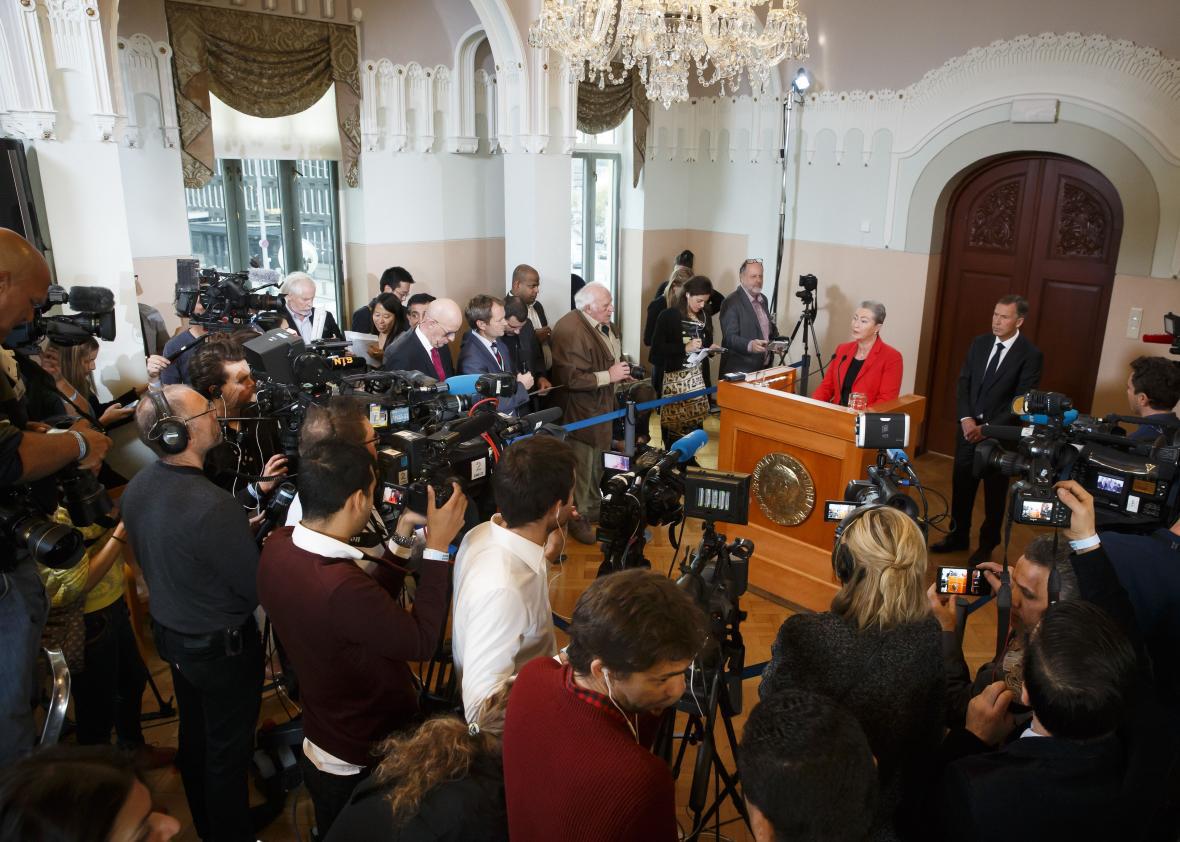The Norwegian Nobel Committee surprised everyone Friday and awarded the 2015 Peace Prize to Tunisia’s National Dialogue Quartet “for its decisive contribution to the building of a pluralistic democracy in Tunisia in the wake of the Jasmine Revolution of 2011.” In other words, for being the only Arab Spring country that succeeded.
The quartet is comprised of the Tunisian General Labor Union; the Tunisian Confederation of Industry, Trade and Handicrafts; the Tunisian Human Rights League; and the Tunisian Order of Lawyers. But the committee’s statement makes clear that the award should be read as a broader recognition of the role of civil society in Tunisia, which, four years after the overthrow of President Zine el-Abidine Ben Ali, is the only Arab Spring country that is still a democracy.
The “Jasmine Revolution” was kicked off by the self-immolation of a street vendor in January 2011. Ben Ali stepped down in the midst of mass protests a few weeks later, followed by the election of government led by the Islamist Ennahda party in October. But in 2013, the country’s transition to democracy looked to be in danger of coming off the rails following the assassination of two opposition lawmakers by suspected extremist Islamist militants. The assassinations led to another round of widespread demonstrations by Tunisians already frustrated with the Islamist-led government and the secular opposition’s failure to adopt a new constitution. It was the labor unions that facilitated meetings between the government and the opposition. An agreement was reached under which Prime Minister Ali Larayedh of Ennahda stepped down in January 2014 in favor of a caretaker government. Later that month, a new constitution was adopted and in December of 2014, the country held its first free presidential elections.
The role of the labor movement, which has been deeply entwined in the country’s democratic development since independence, was particularly key. As the Carnegie Endowment’s Sarah Chayes wrote last year, “without the muscular involvement of the General Union of Tunisian Workers—perhaps the only organization whose power and legitimacy rival the Islamists’—it is unlikely that Tunisia’s remarkable political settlement would have come about.”
Still, the role of the Quartet is not that well known outside of Tunisia, and Friday’s statement by Kaci Kullmann Five, the chairwoman of the committee, indicates that the recognition isn’t meant to be limited to one group: “More than anything, the prize is intended as an encouragement to the Tunisian people, who despite major challenges have laid the groundwork for a national fraternity which the Committee hopes will serve as an example to be followed by other countries.”
The 2011 Arab Spring began in Tunisia before spreading throughout North Africa and the Middle East. But unlike Egypt, which has seen the return of authoritarian rule, or Libya, Yemen, and Syria, which have descended into violence and chaos, Tunisia has maintained a slow and steady progress toward democracy.
There are plenty of explanations for the Tunisian exception, as I wrote earlier this year. Some are structural: It’s a relatively small and ethnically unified country. It also had a dictator who knew when to get out of the way: Ben Ali fled the country less than a month after protests began, sparing Tunisia the rioting and repression seen elsewhere. Tunisia also had a less politically powerful military than Egypt, and the Islamist Ennahda party that took power in the first elections after the revolution was much more moderate and willing to share power than some of its counterparts elsewhere. Most importantly for any post-revolutionary government, it was willing to step down after it lost an election. And, as the Nobel committee recognized Friday, Tunisian civil society led by a powerful labor movement was able to put pressure on political leaders during times of crisis.
Tunisia still faces major challenges from corruption, a sluggish economy, and extremist violence exemplified by the attack that killed 19 people at a museum in downtown Tunis in March. It’s in a dangerous neighborhood, bordering Libya, and worryingly has supplied the largest share of foreign fighters joining ISIS in Syria.
Nonetheless, Tunisia’s fledgling democracy has weathered significant challenges already and is still the Arab world’s only full-fledged one. As the committee put it, Tunisia “shows that Islamist and secular political movements can work together to achieve significant results in the country’s best interests.”
The country’s slow and often messy progress gets a lot less attention than the outright anarchy engulfing other countries in the region, which makes Friday’s recognition, while unexpected, very welcome.
